|
|
|
Sort Order |
|
|
|
Items / Page
|
|
|
|
|
|
|
| Srl | Item |
| 1 |
ID:
177486
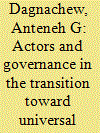

|
|
|
|
|
| Summary/Abstract |
Sub-Saharan Africa faces several challenges that hamper the effort to provide universal electricity access. The challenges are not the result of lack of energy resources but rather the result of governance and institutional problems as well as lack of capital to meet the high investment requirement. This study aims to provide relevant policy recommendations to facilitate the path towards universal electricity access in Sub-Saharan Africa. We do this by identifying the barriers for electricity access and the relevant actors, institutions, and regulations using desk research, stakeholder interviews and expert workshops. The results show that the absence of overall plans and approaches and lack of clarity in policies are the main challenges for the sector. Setting standards for electricity products, such as solar panels, could help to reduce the problem of counterfeit poor quality products. A broader participation of non-governmental actors is needed to increase the speed of electrification. This requires innovative revenue schemes, financial and fiscal incentives and elimination of market distortions. More generally, we conclude that stable and consistent policy frameworks and improved coordination between actors, are crucial to accelerate electrification in the region.
|
|
|
|
|
|
|
|
|
|
|
|
|
|
|
|
| 2 |
ID:
175116
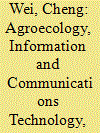

|
|
|
|
|
| Summary/Abstract |
As a bottom-up, grassroots paradigm for sustainable rural development, agroecology is particularly promising for smallholders in many countries in sub-Saharan Africa. However, by adopting agroecology, smallholders will be challenged to take on new perspectives and compile and integrate different sourced information to innovate. Today’s fast evolving information and communications technology in sub-Saharan Africa represents great opportunities for rural populations to enhance the adoption and success of agroecology and to address their daunting challenges simultaneously while conserving, protecting and enhancing natural resources. Agroecology combined with information and communications technology will probably be smallholders’ “precision agriculture” in many developing countries to enhance their food security and livelihood.
|
|
|
|
|
|
|
|
|
|
|
|
|
|
|
|
| 3 |
ID:
133617
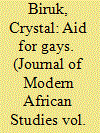

|
|
|
|
|
| Publication |
2014.
|
| Summary/Abstract |
In recent years, 'African homophobia' has become a spectacle on the global stage, making Africa into a pre-modern site of anti-gay sentiment in need of Western intervention. This article suggests that 'homophobia' in post-2009 Malawi is an idiom through which multiple actors negotiate anxieties around governance and moral and economic dependency. I illustrate the material conditions that brought about social imaginaries of inclusion and exclusion - partially expressed through homophobic discourse - in Malawi. The article analyses the cascade of events that led to a moment of political and economic crisis in mid-2011, with special focus on how a 2009 sodomy case made homophobia available as a new genre of social commentary. Employing discourse analysis of newspaper articles, political speeches, the proceedings of a sodomy case, and discussions about men who have sex with men (MSM) as an HIV risk group, I show how African homophobia takes form via interested deployments of 'cultural' rhetoric toward competing ends. This article lends a comparative case study to a growing literature on the political and social functions of homophobia in sub-Saharan Africa.
|
|
|
|
|
|
|
|
|
|
|
|
|
|
|
|
| 4 |
ID:
133618
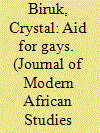

|
|
|
|
|
| Publication |
2014.
|
| Summary/Abstract |
In recent years, 'African homophobia' has become a spectacle on the global stage, making Africa into a pre-modern site of anti-gay sentiment in need of Western intervention. This article suggests that 'homophobia' in post-2009 Malawi is an idiom through which multiple actors negotiate anxieties around governance and moral and economic dependency. I illustrate the material conditions that brought about social imaginaries of inclusion and exclusion - partially expressed through homophobic discourse - in Malawi. The article analyses the cascade of events that led to a moment of political and economic crisis in mid-2011, with special focus on how a 2009 sodomy case made homophobia available as a new genre of social commentary. Employing discourse analysis of newspaper articles, political speeches, the proceedings of a sodomy case, and discussions about men who have sex with men (MSM) as an HIV risk group, I show how African homophobia takes form via interested deployments of 'cultural' rhetoric toward competing ends. This article lends a comparative case study to a growing literature on the political and social functions of homophobia in sub-Saharan Africa.
|
|
|
|
|
|
|
|
|
|
|
|
|
|
|
|
| 5 |
ID:
161328
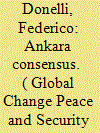

|
|
|
|
|
| Summary/Abstract |
Although research has examined the Turkish agenda for Africa since 2002, few studies have considered Turkey's uniqueness compared to other extra-regional actors. This study is an attempt to analyze and conceptualize the characteristics, benefits, challenges, and limits of Turkey's policy toward the region. This article argues that the characteristics of the Turkish agenda toward sub-Saharan Africa have made Turkey a non-traditional actor in the region, following a novel paradigm of sustainability development: the Ankara consensus. The effects of this model will continue to shape the decisions, policies, and perceptions of the Turkish political elite vis-à-vis Africa and, by extension, the Global South for the foreseeable future.
|
|
|
|
|
|
|
|
|
|
|
|
|
|
|
|
| 6 |
ID:
167115
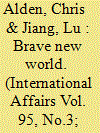

|
|
|
|
|
| Summary/Abstract |
China's ties with Africa are evolving into a multi-faceted relationship of increasing complexity. After nearly two decades of debt-financed infrastructure development, Beijing's exposure to African debt is reaching disquieting proportions with an estimated US$132 billion owed to China in 2016. Managing this new role as Africa's creditor poses uncomfortable questions for creditor and debtor alike. Concurrently, the quiet surge of Chinese investment in manufacturing in Africa is transforming local economies in ways that are beginning to alter the continent's position within the global economy. Finally, the proliferation of Chinese businesses and migrants across Africa is inspiring greater Chinese involvement in UN peacekeeping and private security initiatives.
|
|
|
|
|
|
|
|
|
|
|
|
|
|
|
|
| 7 |
ID:
069391
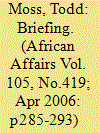

|
|
|
| 8 |
ID:
060978
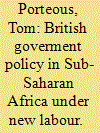

|
|
|
|
|
| Publication |
Mar 2005.
|
| Summary/Abstract |
British government policy in Africa under Labour has been motivated by a combination of humanitarianism and self-interest. The policy has been shaped principally by the Department for International Development (DFID), but also by the Foreign and Commonwealth Office (FCO) and by Prime Minister Tony Blair himself, as he has become more interested in Africa issues. The main focus of the policy has been on poverty reduction and development. The approach has been multi-dimensional, aiming to tackle the principal obstacles to development such as conflict, HIV, debt, governance and trade barriers. The UK has sought to increase its leverage in Africa by working multilaterally with its allies and through the UN, the World Bank and the EU. But the policy has been hampered by the inherent difficulty of promoting sound development policies in weak states, by a lack of UK leverage to affect change, and by a UK preference for statist solutions. Strategic and commercial objectives pursued by the FCO and the prime minister have sometimes appeared as being at odds with the developmental objectives of DFID. Post-9/11 concerns have reinforced the UK's motivation for dealing with Africa's problems, particularly the problems of weak and failed states. But western policies related to the war on terror may give rise to new contradictions and complicate the UK's developmental efforts in Africa.
|
|
|
|
|
|
|
|
|
|
|
|
|
|
|
|
| 9 |
ID:
173917
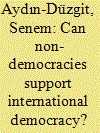

|
|
|
|
|
| Summary/Abstract |
In recent years, there has been a rise of interest in the concept of autocracy promotion, with scholars questioning whether the efforts by authoritarian governments to influence political transitions beyond their borders are necessarily pro-authoritarian. An extension of this question is whether some authoritarian governments may at times find it in their interest to support democracy abroad. This article aims to answer this question by focusing on the case of Turkey. It argues that, despite its rapidly deteriorating democracy since the late 2000s, Turkey has undertaken democracy support policies with the explicit goal of democratic transition in the Middle East and North Africa (MENA) region during the Arab Spring and, while not bearing the intention of democratic transition, has employed democracy support instruments in the form of state-building in sub-Saharan Africa since 2005 to the present day. Based on original fieldwork, the article finds that non-democracies can turn out as democracy supporters, if and when opportunities for strategic gains from democratisation abroad arise. The article further suggests that even in those cases where strategic interests do not necessitate regime change, a non-democracy may still deploy democracy support instruments to pursue its narrow interests, without adhering to an agenda for democratic transition.
|
|
|
|
|
|
|
|
|
|
|
|
|
|
|
|
| 10 |
ID:
148210
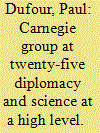

|
|
|
|
|
| Summary/Abstract |
There is a seeming renaissance underway on how science can be used to inform statecraft more effectively. From Science & Diplomacy to the science diplomacy training events sponsored by the American Association for the Advancement of Science (publisher of Science & Diplomacy) and The World Academy of Sciences to the annual Japanese Science & Technology in Society forum, from the United Nations Educational, Scientific and Cultural Organization (UNESCO) World Science Forum to the Organisation for Economic Co-operation and Development’s Science and Technology Ministerial conferences, considerable attention is being paid to the intersection of knowledge with international relations.
|
|
|
|
|
|
|
|
|
|
|
|
|
|
|
|
| 11 |
ID:
104038
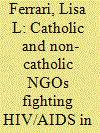

|
|
|
|
|
| Publication |
2011.
|
| Summary/Abstract |
While governments in sub-Saharan Africa work to provide in-country relief for the HIV/AIDS crisis, much health care and infrastructure comes from local or international non-governmental organizations (NGOs). The literature on NGOs suggests that collaboration increases their efficacy. Many non-Catholic NGOs do not work collaboratively with Catholic NGOs on HIV/AIDS, though the Catholic Church has rich and varied resources at its disposal for relief work. Observers often characterize the incompatibility of Catholic and non-Catholic NGOs as tactical, especially with regard to condom use. However, divergent issue framing is a critical and more fundamental distinction between the two groups. Contrasting the Catholic Church's unique spiritual frame with the scientific frame of many non-Catholic NGOs highlights the epistemological and teleological differences between the two. Reconciling these differing approaches, or finding ways to cooperate despite them, is a key element of promoting broader NGO collaboration on HIV/AIDS relief work. This theoretical analysis suggests directions for future empirical research.
|
|
|
|
|
|
|
|
|
|
|
|
|
|
|
|
| 12 |
ID:
009756
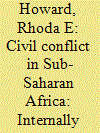

|
|
|
|
|
| Publication |
Winter 1995-96.
|
| Description |
27-53
|
|
|
|
|
|
|
|
|
|
|
|
|
|
|
|
| 13 |
ID:
188058
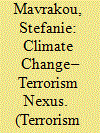

|
|
|
|
|
| Summary/Abstract |
A growing number of policymakers around the world have recognized climate change as an escalating security threat and increasingly point to the climate change—terrorism nexus in particular. This critical literature review provides an analysis of the current state of research on the causal and correlative links between climate change, intermediary factors—such as resource scarcity, loss of economic opportunities, and instability—and terrorism in sub-Saharan Africa. Moving beyond a review of substantive themes within the existing body of scholarly research examining this topic, this article critically evaluates the theories, assumptions, and methods behind the literature. In doing so, the review identifies noteworthy trends, as well as gaps and shortcomings in the current research. Our review finds that the majority of the literature has observed a positive correlation between climate change and terrorism. More precisely, the current body of research overwhelmingly assesses that climate change indirectly leads to terrorism via its impact on conditions often considered to be drivers of terrorism in sub-Saharan Africa. Still, gaps remain in empirically backing up these assertions and examining the relationship between climate change, intermediary factors, and terrorism in more depth. We use our critical review and analysis to guide recommendations for further research into this emerging and timely field of study.
|
|
|
|
|
|
|
|
|
|
|
|
|
|
|
|
| 14 |
ID:
148247
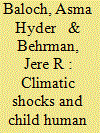

|
|
|
|
|
| Summary/Abstract |
We examine the impact of four different climatic shocks as perceived by households and community representatives on child learning and health outcomes in Ethiopia; one of the poorest countries in Sub-Saharan Africa. Two waves of household panel data for the years 2006 and 2009 are used and data is collected from both urban and rural areas of Ethiopia. For child learning outcomes we use enrollment, Peabody picture vocabulary and math test scores and for health outcomes we use body mass index z-scores and height for age z-scores.
|
|
|
|
|
|
|
|
|
|
|
|
|
|
|
|
| 15 |
ID:
158715
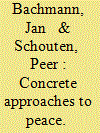

|
|
|
|
|
| Summary/Abstract |
Do roads literally lead to peace? While seemingly a strange question to ask, today's peacebuilders certainly seem to think so. After decades of focus on questions of governance, today, instead, infrastructure primes in state- and peacebuilding missions in many fragile and conflict-affected societies. Peacebuilding efforts in places ranging from Somalia to Afghanistan to the Congo are, to a considerable extent, interventions in the built environment. While infrastructure has always been around in post-conflict reconstruction, today, infrastructure is mobilized during ongoing conflict, invested with aspirations of improving security and stability. To be sure, infrastructure played a big role in the formation of strong western states. But can we take this experience to try and forge political orders of concrete and steel? At a first glance, a theory of change that reorders societies by deploying the hidden powers of the built environment seems compelling, and measurable and concrete infrastructure outputs, additionally, fit perfectly within today's more pragmatic approaches to peace. However, based on examples from across the contemporary global peacebuilding landscape, we show that infrastructure neither amounts to a uniform force, nor is it clear what its impact on peace exactly is. What is certain is that infrastructure is profoundly entwined with contemporary peacebuilding, and that we therefore need to develop novel theoretical angles to come to terms with the ubiquitous politics of infrastructure.
|
|
|
|
|
|
|
|
|
|
|
|
|
|
|
|
| 16 |
ID:
158844
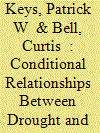

|
|
|
|
|
| Summary/Abstract |
Much of the literature on climate change adaptation claims the destabilizing consequences of environmental crises are mitigated by sociopolitical conditions that influence a state's susceptibility to scarcity-induced violence. However, few cross-national studies provide evidence of conditional scarcity-conflict relationships. This analysis of drought severity and civil conflict onset in sub-Saharan Africa (1962–2006) uncovers three sociopolitical conditions that influence the link between environmental scarcity and civil conflict: social vulnerability, state capacity, and unequal distribution of resources. Surprisingly, we find drought does not exacerbate the high risk of conflict in the vulnerable, incapable, and unequal states thought to be especially susceptible to increased scarcity. Instead, drought negates the peace-favoring attributes of stable states with less vulnerable populations. During severe drought, states with sociopolitical conditions that would otherwise favor peace are no less likely to suffer conflict than states with sociopolitical conditions that would otherwise increase the risk of violence. These findings, which are robust across several measures of these sociopolitical concepts, suggest environmental scarcity is most likely to increase the risk of conflict where populations have more to lose relative to periods with more favorable weather.
|
|
|
|
|
|
|
|
|
|
|
|
|
|
|
|
| 17 |
ID:
158714
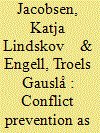

|
|
|
|
|
| Summary/Abstract |
Contemporary conflict prevention depends on information gathering and knowledge production about developments within the borders of a state, whose internal affairs have been deemed precarious by external actors. The international community, especially the United Nations (UN), calls this early warning and early action. However, for governments whose affairs are considered in need of monitoring, preventive endeavours—and the knowledge production they entail—can be seen as ‘early aggression’. In this article, we argue that seeing knowledge production as having power effects reveals contemporary conflict prevention as an interventionary practice. Through an analysis of the international community's preventive diplomacy vis-à-vis Burundi (2015–2016) we highlight three unintended power effects: privileging the UN's knowledge production created resistance to international involvement from the Government of Burundi, it led to a change in patterns of violence and to a backlash against the institutionalization of international monitoring beyond Burundi, and it enabled arguments for further, more forceful, intervention possibilities. This framing enables us to understand the recent return to conflict prevention not as a retreat from liberal interventionism, but as a pragmatic response to its purported crisis. Crucially, although conflict prevention falls short of military intervention, it nonetheless leaves important interventionist footprints.
|
|
|
|
|
|
|
|
|
|
|
|
|
|
|
|
| 18 |
ID:
184994
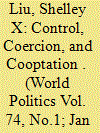

|
|
|
|
|
| Summary/Abstract |
This article examines how rebels govern after winning a civil war. During war, both sides—rebels and their rivals—form ties with civilians to facilitate governance and to establish control. To consolidate power after war, the new rebel government engages in control through its ties in its wartime strongholds, through coercion in rival strongholds where rivals retain ties, and through cooptation by deploying loyal bureaucrats to oversee development in unsecured terrain where its ties are weak. These strategies help to explain subnational differences in postwar development. The author analyzes Zimbabwe's Liberation War (1972–1979) and its postwar politics (1980–1987) using a difference-in-differences identification strategy that leverages large-scale education reforms. Quantitative results show that development increased most quickly in unsecured terrain and least quickly in rival strongholds. Qualitative evidence from archival and interview data confirms the theorized logic. The findings deepen understanding of transitions from conflict to peace and offer important insights about how wartime experiences affect postwar politics.
|
|
|
|
|
|
|
|
|
|
|
|
|
|
|
|
| 19 |
ID:
192040
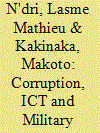

|
|
|
|
|
| Summary/Abstract |
It has been argued that large military spending is often a crucial constraint in Sub-Saharan Africa (SSA) countries, and high corruption has enabled these countries to keep such large military spending. One possible remedy is to promote information and communication technology (ICT), which may cause the anti-corruption policies to become more effective in increasing transparency for the public and reducing unnecessary and abusive military spending. This study discusses the nexus among corruption, military spending, and ICT with a panel data of 48 SSA countries from 2003 to 2015. Our analysis reveals that when ICT prevails, military spending is negatively associated with the control of corruption, so that anti-corruption policies with the usage of ICT could reduce the extravagant budget allocation to military spending. Policymakers should associate sound ICT policy with traditional anti-corruption factors to bring more transparency and less corrupt behaviors in the military department. The reduction in the misuse of military allocation enables the country to increase nonmilitary public spending to face sustainable development challenges for the sake of the population.
|
|
|
|
|
|
|
|
|
|
|
|
|
|
|
|
| 20 |
ID:
175904
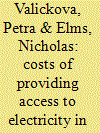

|
|
|
|
|
| Summary/Abstract |
Access to reliable energy is recognised as a key driver of human and economic development. Despite this, today only 45% of the population in Sub-Saharan Africa has access to electricity. Sustainable Development Goal number 7 calls for ensuring access to affordable, reliable, sustainable and modern energy for everyone. Yet, at the current rate of progress, less than 60% of the population in Sub-Saharan Africa will have access to electricity by 2030. In view of the urgent need to accelerate the rate at which electricity access is provided, we developed a detailed least-cost optimisation model to identify the incremental costs of providing access for the group of 12 countries in the Southern African Power Pool. Our analysis shows that achieving universal access by 2030 in the region, would lead to an incremental generation cost of between 5.2 and 11.4 US$2018 billion, depending on the consumption of newly connected households. This corresponds to an increase of system generation costs by 4–8% and the levelized incremental cost of supply to the customer of 108–116 US$2018 per megawatt hour. This is lower than what a typical household pays for poor alternatives to electricity, such as kerosene for lighting, implying that policy makers should accelerate access.
|
|
|
|
|
|
|
|
|
|
|
|
|
|
|
|
|
|
|
|
|